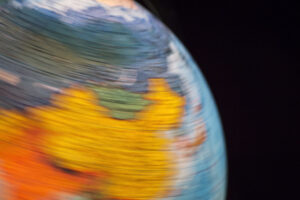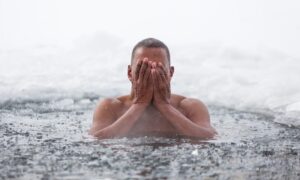In her 80th year, the Babushka of Baikal still skates gracefully on the original blades her father made for her 70 years ago.
Lyubov Morekhodova has generated worldwide attention for her ice skating prowess on Siberia’s frozen Lake Baikal. But the 79-year-old woman –- affectionately known as the Babushka (meaning grandmother) of Baikal — can’t understand what all the fuss is about.

Lyubov Morekhodova has been skating since she was eight years old and still wears the skates her father made for her shortly after World War II. Photo: The Siberian Times
Morekhodova has been ice skating since she was eight years old. Initially, it was a resourceful way to shorten the four-kilometre hike between school and home. Over the years, the pastime has served as a peaceful escape from her hard-working lifestyle.
Lake Baikal, the largest freshwater lake in the world by volume, contains approximately 23 percent of the world’s surface water. Larger in surface area than the entire country of Belgium, with more water than all the Great Lakes combined, the temperature around Lake Baikal can plummet below minus 50˚C in midwinter.
Morekhodova was born In the village of Shara-Togot in the Irkutsk region, just weeks before World War II began. She was one of seven children to a forester father and homemaker mother. When construction began on the Irkutsk Dam, the family was relocated to the city of Khaly. Here, Morekhodova was first introduced to ice skating.
To halve the distance to school each day, she came up with a plan to skate across the lake. But where could she acquire a pair of skates in rural Siberia? Her father found a homemade solution.
“He cut two strips out of a steel saw, inserted them into planks of wood, and attached the wood to valenki [felt boots],” Morekhodova explained. “He didn’t know how to skate himself, but he went a very long way to support me.”
A few years later when she moved to boarding school, the walk home quadrupled, so again she shortened the route by skating.

Morekhodova’s original homemade skates still take her across the frozen surface of Lake Baikal. Photo: The Siberian Times
“Once when I broke through the ice and fell in, I only survived because two of my classmates pulled me out,” Morekhodova recalls. “I had to run all the way back home with my clothes feeling like a sheet of ice.”
Despite that one near miss, being on the frozen lake offers a respite from her hard rural life in Siberia.
She wakes daily at 5 am to tend her cattle, which struggle to find grass during the winter. Once, three calves went missing and never came back. As she often does when she’s searching for wayward livestock, Morekhodova put on her skates for the search.
Before tending cattle, she processed fish in the family shop, worked in security and as an apprentice welder. She also worked for 42 years as a technologist in a factory. After her husband and children died, farming helped her regain a sense of purpose. She now has 11 cows, plus hens, four dogs and three cats.
To Morekhodova, skating is simply a joyful activity. But when a friend of hers posted a video of her on the ice a few years ago, she suddenly started receiving calls from all over the world.
Politely, Morekhodova answers questions all hours of the night from interested reporters. She kindly obliges them by sending photos from her simple phone, although coverage isn’t ideal in this part of Siberia. Once she was even asked to give a public speech in Moscow, a city she’d not visited since the 1970s.

The wind keeps the snow from building up on the ice of Lake Baikal. Photo: Turnstile Tours
Though Morekhodova may not understand her newfound attention, it’s likely that for everyone else, the joy stems from seeing such carefree grace in an elderly woman. Seeing her swirl on the original skates built by her father all those years ago is mesmerizing.
Skating is a sport often reserved for the young and athletic, and those in their twilight years rarely indulge. But Morekhodova even competes in local races. The five-kilometre event is her favorite.
Asked if she ever rests, she replies, “Of course. In the evenings when I watch TV or play sudoku, or check maps to find all those exciting places they mention in the news.”

Photo: The Siberian Times






